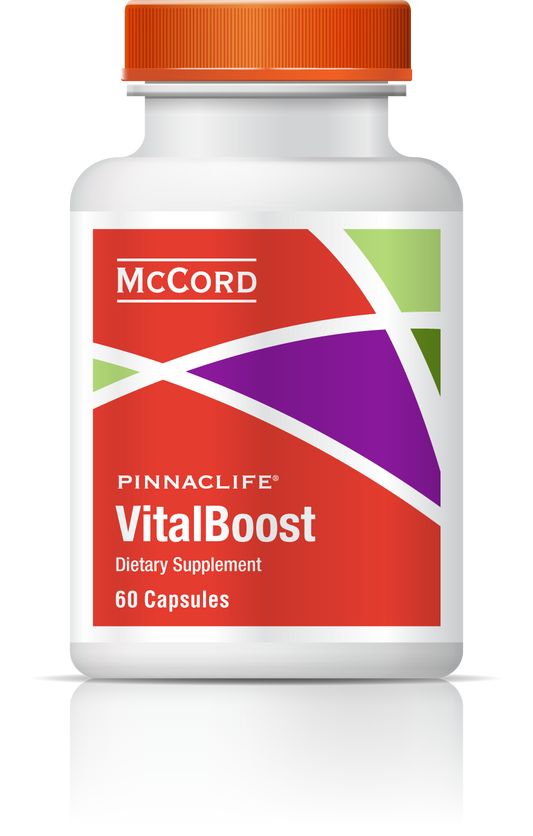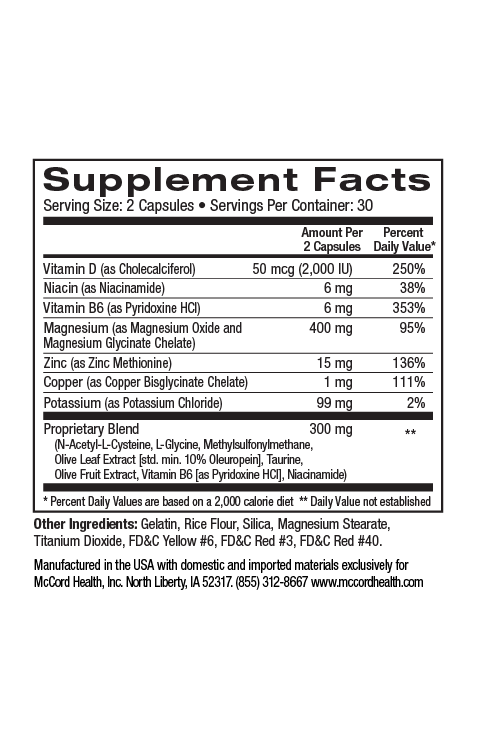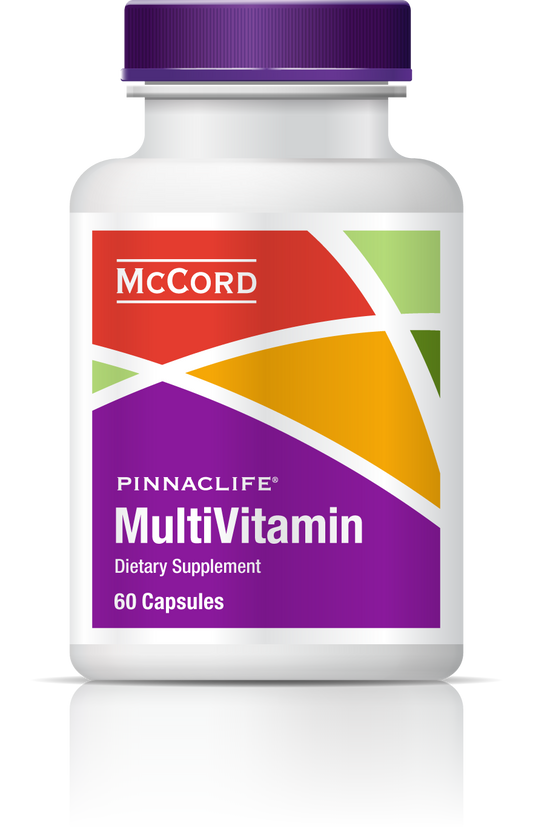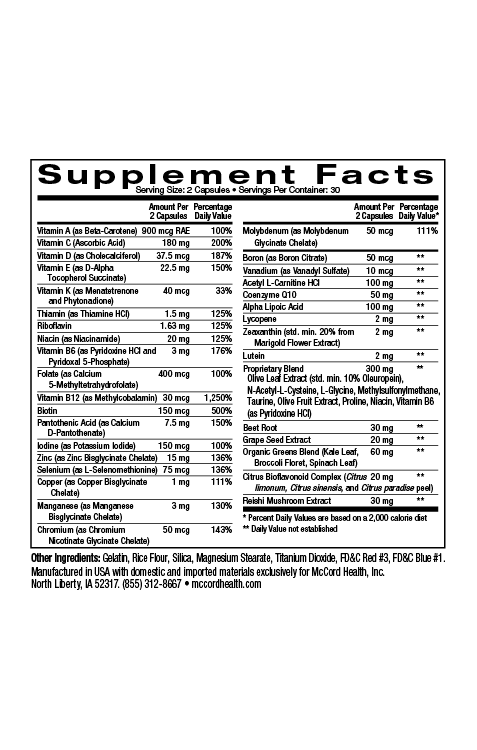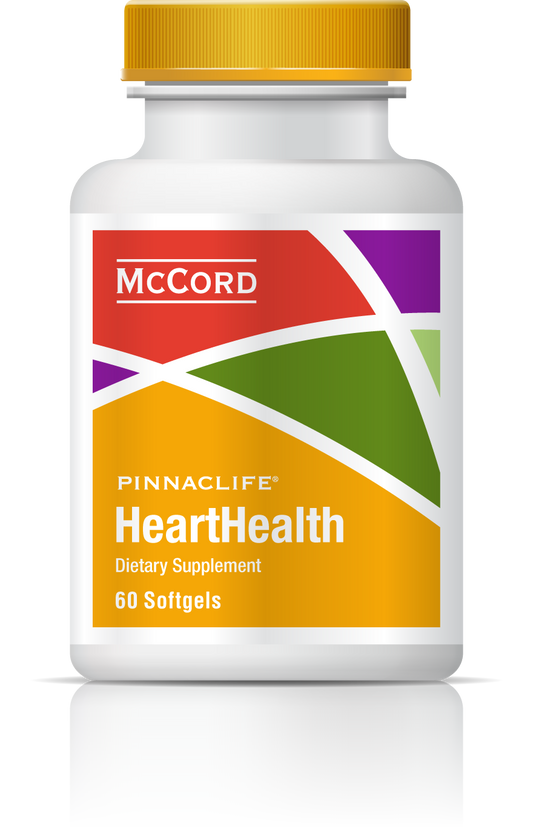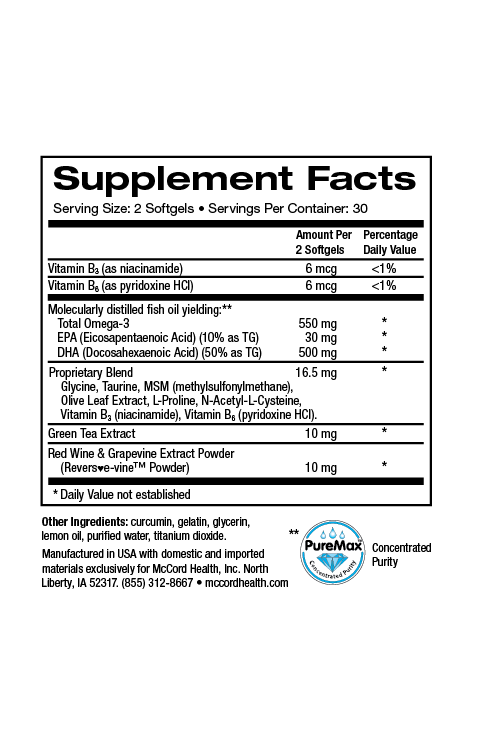A balanced diet is essential to healthy living, but despite our best intentions healthy food options are not always available, affordable, convenient, or practical resulting in gaps in daily nutrition. Vitamin supplements are sometimes needed to fill the gaps left from inadequate dietary intake from food sources.
- Your body requires vitamins, minerals, antioxidants, amino acids, and more to stay healthy
- The best way to obtain these vital nutrients is through a healthy balanced diet - especially fresh vegetables and fruits
- Most people don't get adequate nutrients from their diets for many reasons - and health suffers as a consequence
- Supplements can play an important role in filling the nutritional gaps created by less than ideal diets
Tell me More!
When it comes to living a healthy life, what do you put at the top of your list of things to improve? Is it increasing your exercise? Sleeping more? Eating more nutritious foods?
We know that all of these are extremely important for good health, yet many tend to struggle with making some of these lifestyle changes. This is especially true when it comes to eating more nutritious foods including vegetables and fruits.1
Diets Need Diversity
Have you ever noticed when you're on a diet that you tend to eat a lot of the exact same foods every day? You know the routine - baby carrots, an apple, boiled egg, low-fat greek yogurt, turkey sandwich on whole wheat bread - rinse and repeat. Sure, it might not be those exact foods EVERY day, but you get the idea.
This dietary repetitiveness can lead to boredom and even distaste for certain foods. More importantly, it can severely limit the diversity of nutrients that you are consuming. You might be getting adequate amounts or even too much of some nutrients, but completely missing out on others.
"But healthy foods don't taste good"
Improving the diet is difficult for some people simply because of personal taste. Perhaps you just don’t like the flavors or textures of certain foods and choose to avoid them. Now there are things you can do to train your taste buds to like foods, and learning to cook with healthy herbs and spices helps a lot as well - but that's a discussion for another day.
Take olives for example: It's clear that olives contain loads of potent antioxidants, but at the same time we understand that there are some people that just do not like the taste of olives and refuse to eat them. We also know commercial olives typically contain a lot of sodium, so there's issues with eating too many in that form - but you may still want to provide your body the health benefits of olives even if you don't like eating them, or are on a salt restricted diet.
"I can't afford the healthy foods"
Many people want to eat healthier but just cannot afford or even find the healthy options in their local stores. Unfortunately, for many this is unavoidable since the healthiest foods are fresh with short shelf lives which drives up the price at the store and limits how far they can be transported before spoiling.
Nutritional value tends to decline when foods are preserved by canning, cooking, etc. so those cheaper options are generally less nutritious. This is a significant barrier to millions of people who wish to eat healthier but do not have access to fresh healthy foods.2–6 Freezing fruits and vegetables tends to be better at preserving nutritional content, so if fresh is not available or economical, frozen is the next best option.
Now remember, the cost of illness is also very high. So the money you save on cheap processed food may just go right back into expensive medications, procedures, and doctor visits that you'd prefer to avoid. Also remember that more expensive doesn't always mean healthier - though a lot of times it seems to be that way.
“I don't have time or even know how to cook!”
Even when people are able to find and purchase healthy foods, they encounter another barrier with the time required for food prep and cooking - or perhaps there is a lack of knowledge about how to cook healthy meals. Many of us have very busy lives and don't have a lot of free time that we are willing to give up to prepare healthy homemade meals. You made the healthy choice to join a fitness club - but that just ate away at what little time you had for cooking, cleaning, socializing, hobbies, and relaxation!
Convenience Foods Often Don't Provide Nutrients
Not enough time - not enough money - so we turn to cheap convenient food options. But generally speaking, the low-cost convenience foods that we routinely turn to don't provide the nutrients or potent antioxidants that the body needs. Many practitioners are beginning to recognize that for some of their patients, a nutritional supplement may be the only way to consistently get them the nutrients they need.
Common Nutrient Deficiencies
According to survey data collected for the National Health and Nutrition Examination Survey (NHANES-III), a large portion of Americans are not getting enough of several vital nutrients without the use of supplementation. The following chart shows the percentage of people age 2 and up that are not obtaining the estimated average requirement (EAR) from their diets on a daily basis without the use of nutritional supplements.7
| Dietary Fiber | 97%8 |
| Vitamin D | 93% |
| Vitamin E | 91% |
| Magnesium | 55% |
| Calcium | 49% |
| Vitamin A | 45% |
| Vitamin C | 37% |
| Vitamin K | 31% |
| Vitamin B6 | 12% |
| Folate | 11% |
| Zinc | 11% |
Use Supplements to Fill Nutritional Gaps
If you have the desire to nourish your body but can’t afford or access the proper foods, or don't have time or knowledge to prepare them - what options are available to make sure your daily nutritional needs are consistently met?
Healthcare providers know that the body requires vitamins, minerals, amino acids, polyphenols, and a whole host of other nutrients every day in order to promote optimum health. Nutrient deficiencies are continuously being linked to decreased health status and increased risk of major diseases including heart disease, cancer, diabetes, depression, osteoporosis, hormone imbalances, neurodegenerative disorders, and more.9–12 There is no argument that we should ideally try and obtain nutrients from a natural diet compared to artificial sources, however as outlined above, this is not always possible or feasible.
The purpose of nutritional supplements is to augment your diet with naturally derived nutrients and help fill in the gaps that might be left from a diet that is low on nutrient density and diversity. This is why they are called nutritional supplements and not nutritional replacements – they are only intended to add an extra boost to the food you are eating or fill in nutritional gaps.
McCord Research Proprietary Blend Supplements were designed as an easily accessible and affordable way to boost the nutritional value of your diet while also providing patented antioxidants support to promote optimum health. The Proprietary Blend supplements contain a full spectrum of nutrients and antioxidants that are essential for every cell in your body. Incorporating Proprietary Blend supplements can help you consistently provide your body the tools it needs for optimum health, to keep you feeling great!
References
- Dittus KL, Hillers VN, Beerman KA. Benefits and barriers to fruit and vegetable intake: relationship between attitudes and consumption. J Nutr Educ. 1995;27(3):120–126.
- United States Department of Agriculture. Access to Affordable and Nutritious Food: Measuring and Understanding Food Deserts and Their Consequences: Report to Congress. (Ver Ploeg M, ed.). DIANE Publishing; 2010:150.
- Walker RE, Block J, Kawachi I. Do residents of food deserts express different food buying preferences compared to residents of food oases? A mixed-methods analysis. Int J Behav Nutr Phys Act. 2012;9:41.
- Wrigley N, Warm D, Margetts B. Deprivation, diet, and food-retail access: findings from the Leeds “food deserts” study. Environ Plan A. 2003;35(1):151–188.
- Walker RE, Keane CR, Burke JG. Disparities and access to healthy food in the United States: A review of food deserts literature. Health Place. 2010;16(5):876–84.
- Hendrickson D, Smith C, Eikenberry N. Fruit and vegetable access in four low-income food deserts communities in Minnesota. Agric Human Values. 2006;23(3):371–383.
- Fulgoni III VL, Keast DR, Bailey RL, Dwyer J. Foods, Fortificants, and Supplements: Where Do Americans Get Their Nutrients? J Nutr. 2011;141:1847–1854.
- Clemens R, Kranz S, Mobley AR, et al. Filling America’s fiber intake gap: summary of a roundtable to probe realistic solutions with a focus on grain-based foods. J Nutr. 2012;142(7):1390S–401S.
- McKay DL, Perrone G, Rasmussen H, et al. The effects of a multivitamin/mineral supplement on micronutrient status, antioxidant capacity and cytokine production in healthy older adults consuming a fortified diet. J Am Coll Nutr. 2000;19(5):613–21.
- Gaziano JM. Multivitamins in the Prevention of Cancer in Men<subtitle>The Physicians’ Health Study II Randomized Controlled Trial</subtitle><alt-title>Multivitamins in the Prevention of Cancer in Men</alt-title>. JAMA J Am Med Assoc. 2012;308(18):1871.
- Holmquist C, Larsson S, Wolk A, de Faire U. Multivitamin Supplements Are Inversely Associated with Risk of Myocardial Infarction in Men and Women--Stockholm Heart Epidemiology Program (SHEEP). J Nutr. 2003;133(8):2650–2654.
- Morris CD, Carson S. Routine Vitamin Supplementation To Prevent Cardiovascular Disease: A Summary of the Evidence for the U.S. Preventive Services Task Force. Ann Intern Med. 2003;139(1):56–70.
Disclaimer: These statements have not been reviewed by the FDA. These products are dietary supplements and are not intended to treat, cure, or prevent any disease. The decision to use these products should be discussed with a trusted healthcare provider. The authors and the publisher of this work have made every effort to use sources believed to be reliable to provide information that is accurate and compatible with the standards generally accepted at the time of publication. The authors and the publisher shall not be liable for any special, consequential, or exemplary damages resulting, in whole or in part, from the readers’ use of, or reliance on, the information contained in this article. The publisher has no responsibility for the persistence or accuracy of URLs for external or third party Internet websites referred to in this publication and does not guarantee that any content on such websites is, or will remain, accurate or appropriate.

